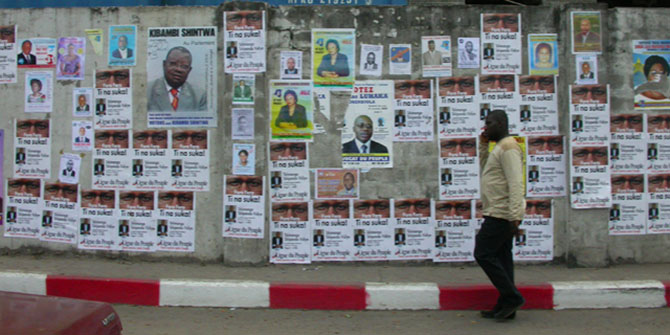LSE’s Nabila Ramdani says that the extraordinary life of Ahmed Ben Bella provides an object lesson in the pitfalls of democratic transition. This post originally appeared in UK’s Guardian newspaper.
Anybody who believes that the Arab spring might lead to an immediate flourishing of peace and democracy around the Middle East and North Africa would do well to study the life of the first president of independent Algeria, Ahmed Ben Bella, who died recently at the age of 95. If there was one politician who personified the blood-soaked process of sudden political and social change, then it was Ben Bella. Doubt, betrayal and extreme violence marked his career as much as idealism. Right up until his death, the former president believed that the nominally popular and representative republic he helped forge was anything but.

Remember that Ben Bella was originally a French war hero, as loyal to his overseas colonial masters as he was to his fellow countrymen. He took up arms against the Nazis during the second world war, fighting in battlefields across Europe. At Monte Cassino, in Italy, in 1944, Ben Bella rescued his commanding officer under fire and was personally awarded the Médaille Militaire by General Charles de Gaulle.
A decoration from the statesman who would eventually hand Algeria back to its own people might have pacified Ben Bella. Like so many protesters during the Arab spring, he was certain that civilised western powers were caring allies. But this view changed abruptly in May 1945, when a number of European settlers died during an anti-colonial protest in Sétif, 200 miles east of Algiers. Retribution was swift and disproportionate – up to 45,000 indigenous Algerians were murdered by vigilantes supported by the French army. The slaughter turned Ben Bella into an angry rebel, intent on nothing less than unconditional independence.
In perfect historical symmetry with Ben Bella’s death, Algeria has just marked the end of the war that the revolutionary helped start. March saw the 50th anniversary of the 1962 ceasefire that ended 132 years of colonial repression. Little has been made of the anniversary in the west, and a brief history of the savage eight-year Algerian war, in which up to 1.5 million Algerians died, gives an indication why.
All sides, including Ben Bella’s Algerian independence fighters of the National Liberation Front (FLN), were racked by internal divisions expressed in regular assassinations and mutilations. Hardline French officers in the Secret Army Organisation (OAS) planned coups against the government of De Gaulle, as he gradually turned his back on France’s imperial legacy and handed Algeria back.
Once he did, the harkis – indigenous Algerians who fought for the occupying power and worked for the Paris-based civil service – were detested by both sides. Independence also created unique problems for the pieds noirs, the colonialist French who had lived such affluent lives in the north African country before being forced to return home.
Numerous attempts by the French to murder Ben Bella failed, resulting in him becoming known as “the invisible one”. He was elected president under a new constitution in 1963, but his early experiments in Marxist collective farming were a disaster. Emigration – which was already massive after the war – increased, and Ben Bella himself resorted to shooting his rivals.
His former friend and FLN enforcer Houari Boumedienne soon launched a successful bid for power in 1965, capturing Ben Bella, who remained under house arrest until 1980. He then went into exile, living in Switzerland, before finally returning to Algeria to compete in elections in 1991, when he was in his 70s. By this time the entire country was involved in a bitter civil war in which thousands more died. “The Arab-Islamic people are in danger,” he said at the time, adding: “the entire west is against us.”
In fact Algeria was failing miserably to govern itself, as nationalist ideals of democracy and peace gave way to ruthless pragmatism. Rather than establishing effective democratic institutions, the postwar period has been marked by conflict, terrorism and economic hardship.
Referring to Ben Bella’s demise in the context of May parliamentary elections, a spokesman for the prime minister’s party said: “This death is a loss for Algeria and the world, especially at a time when Algeria is approaching a historic turning point aimed at peaceful change, which the president always wanted”. As Ben Bella’s near-century shows, the successful overthrow of repressive masters may eventually lead to democracy, but it is only a start.
Follow Nabila Ramdani on twitter @NabilaRamdani or visit her website http://www.nabilaramdani.com/.





